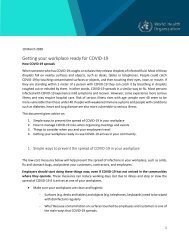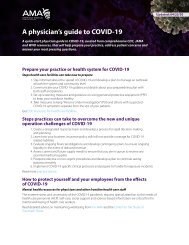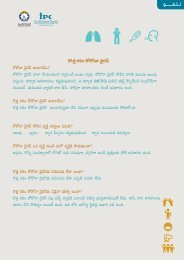WHO - Basic Psychosocial Skills- a guide for covid-19 responders
Basic Psychosocial Skills A Guide for COVID-19 Responders
Basic Psychosocial Skills A Guide for COVID-19 Responders
Create successful ePaper yourself
Turn your PDF publications into a flip-book with our unique Google optimized e-Paper software.
Further resources<br />
Quick Tips on COVID-<strong>19</strong> and Migrant, Refugee and<br />
Internally Displaced Children (UNICEF):<br />
https://uni.cf/2VZIDCk<br />
Supporting those living in refugee camps and in<strong>for</strong>mal refugee and<br />
migrant settings<br />
Specific challenges <strong>for</strong> people living in settings of this kind include<br />
not being able to access basic needs such as food, shelter,<br />
water, sanitation, hygiene and adequate health care; not being<br />
able to follow rules on physical distancing due to crowded<br />
conditions; and experiencing human rights abuses from those<br />
en<strong>for</strong>cing movement restrictions. Those who remain working in<br />
refugee camps when other agencies might have left may have<br />
an increased and overwhelming workload. Also, refugees and<br />
others who are displaced have already suffered the loss of home,<br />
community, loved ones or livelihoods, and may<br />
have fewer internal and external resources to cope<br />
with the COVID-<strong>19</strong> pandemic.<br />
Supporting people with disabilities<br />
People with disabilities may experience a number of barriers in<br />
accessing relevant and inclusive in<strong>for</strong>mation about COVID-<strong>19</strong>,<br />
its spread and means of staying protected. People living in<br />
institutions will be affected by the issues highlighted above <strong>for</strong><br />
those living in care homes, and they may be at risk of abuse<br />
and/or neglect. In environments that do not adequately address<br />
inclusion, people with disabilities generally have less access to<br />
care and services, including food, health care, basic services and<br />
in<strong>for</strong>mation. There<strong>for</strong>e, people with disabilities may suffer more<br />
severe consequences during this crisis.<br />
Further resources<br />
Toward a Disability-Inclusive COVID<strong>19</strong> Response:<br />
10 recommendations from the International Disability Alliance:<br />
https://bit.ly/3anq4NX<br />
Disability Inclusive Community Action – COVID-<strong>19</strong> Matrix (CBM):<br />
https://bit.ly/2KooqRu<br />
<strong>19</strong>












